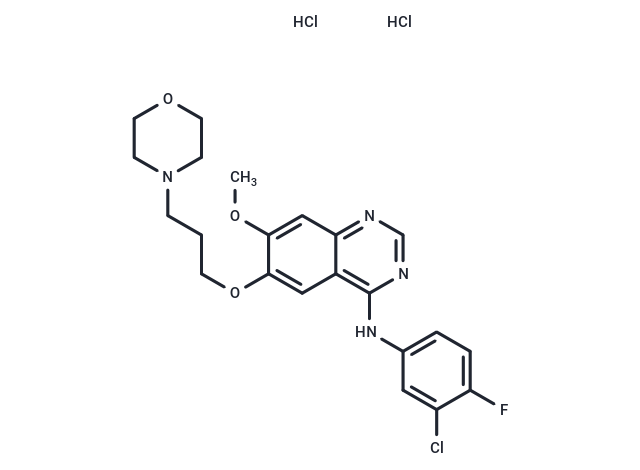Shopping Cart
- Remove All
 Your shopping cart is currently empty
Your shopping cart is currently empty

Gefitinib dihydrochloride is a potent, selective, orally active EGFR tyrosine kinase inhibitor (IC50: 33 nM). Gefitinib dihydrochloride selectively inhibits EGF-stimulated tumor cell growth with an IC50 value of 54 nM and blocks EGFR autophosphorylation in EGF-stimulated tumor cells. Gefitinib dihydrochloride induces autophagy and apoptosis, and can be used in studies of cancer-related diseases such as lung and breast cancer.

| Pack Size | Price | Availability | Quantity |
|---|---|---|---|
| 25 mg | $1,520 | 1-2 weeks | |
| 50 mg | $1,980 | 1-2 weeks | |
| 100 mg | $2,500 | 1-2 weeks |
| Description | Gefitinib dihydrochloride is a potent, selective, orally active EGFR tyrosine kinase inhibitor (IC50: 33 nM). Gefitinib dihydrochloride selectively inhibits EGF-stimulated tumor cell growth with an IC50 value of 54 nM and blocks EGFR autophosphorylation in EGF-stimulated tumor cells. Gefitinib dihydrochloride induces autophagy and apoptosis, and can be used in studies of cancer-related diseases such as lung and breast cancer. |
| Molecular Weight | 519.82 |
| Formula | C22H26Cl3FN4O3 |
| Cas No. | 184475-56-7 |
| Storage | Powder: -20°C for 3 years | In solvent: -80°C for 1 year | Shipping with blue ice. |

Copyright © 2015-2025 TargetMol Chemicals Inc. All Rights Reserved.